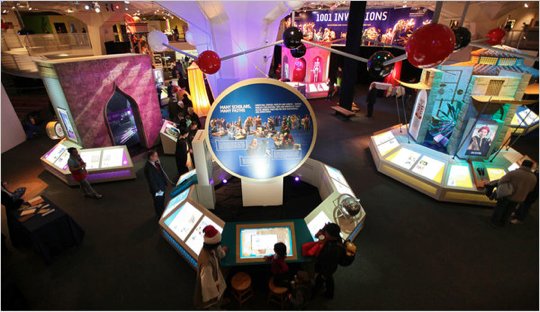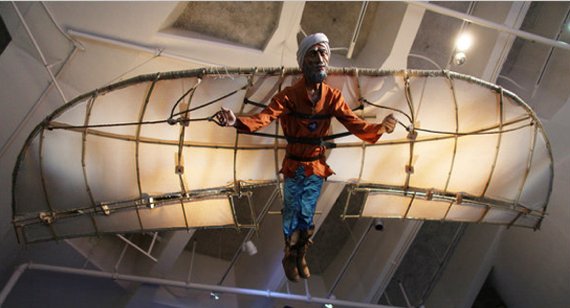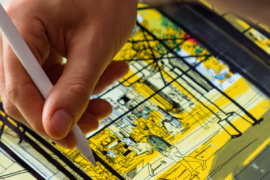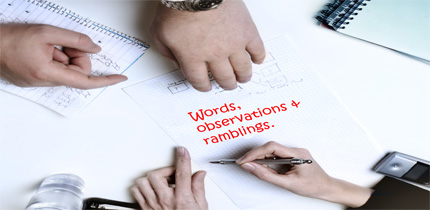By Hamda AlHashemi (@Hamda_AlHashemi)
Imagine watching a 2-year-old kid grabbing everything in sight, nibbling it, licking it, biting it and then throwing it! And we, as grown ups, wonder “what possesses this child? It is a silly, daily object yet kids find it very intriguing and amusing.” Human beings are always amused by new things they have never experienced and that enthusiasm is what drives us to be innovative and creative. Because of that, innovation, science, culture and technology have thrived throughout the years. But are we following the same pace or have we slowed down?
Andre Gide once said, “Man cannot discover new oceans unless he has the courage to lose sight of the shore.” How hard are we trying to create breakthroughs and invent unimaginable things? Are new inventions as important as those of light, electricity, or telecom? Or are we content with what we have that it is not as important to seek the potential of the things around us.
In the year of 2010, there was an exhibition in London that promoted awareness about inventions made in the Muslim civilization. The 1001 Inventions exhibition uncovered 1000 years of science and technology and innovation by different men and women from the Muslim world. Children and adults were all mesmerized by what they experienced there. More than 800,000 visitors were drawn to discover a world driven by passion and loyalty, people who discovered and created incredible things with primitive resources.


Ibn Sina, Al Biruni, Ibn Khaldun, Ibn Taimiya, Abbas Bin Firnas, and hundreds of other scientists and inventors have mastered the fields of arts, astronomy, chemistry, geography, medicine, economy, mathematics, biology, psychology, political science, and much more. They spent their entire lives seeking knowledge, reading and experimenting. Shariff Abdullah Al Idrisi Al Hashimi of Sicily drew the first map in the world. Muslim surgeons such as Al Tabari, Al Biruni, and others developed most of the surgical tools that are still used till this day.
No matter how much I talk about their accomplishments and astonishing efforts, I will not give them the recognition they deserve. Ira Erwin said that the greatest discoveries have come from people who have looked at a standard situation and seen it differently. We look at something and think to ourselves: “this can be enhanced.” But how many times do we think of discovering something that we have never seen? And what do we actually do about it? To us, what stands in our way is our continuous belief that the risks are too high and people will call us crazy.
In 1877, how many people knew that they could have light without lighting a match? One man, and that man was Thomas Edison. I am sure that many people called him crazy for even thinking about it. People were satisfied with sitting at home and lighting a candle but that was not good enough for Edison. The idea of “illumination” fascinated him and so he tackled it with everything he had. People frequently remind us of how we cannot do this or that. How long will we let them blind us from reaching our true potential?
The way the exhibition communicated the information presented was intelligent. The interior space itself spoke so much. They used design elements for each invention and integrated the information within the design itself to interest the visitors in knowing more about it. They also used 3D animation to make some of the Muslim inventors talk about their accomplishments; and that is artistic creativity in itself. Not only will visitors learn about the inventors, but they will also feel a connection with them; how often do we get to meet famous dead people?

Words that every discouraged person should repeat to himself\herself are these: “Mistakes are the portals of discovery”. Edison failed more than 1000 times before coming up with a successful prototype. You never waste time if you spend it seeking the truth. The Muslim civilization was one of the most significant of all civilizations and the most dominant and powerful; it had so many life altering accomplishments that were built on later. Are we going to let down our ancestors? Or are we going to build on their legacy? We owe it to them.
Links related to topic: http://www.1001inventions.com/1001inventions
21st Issue – December 2011
Here We Start – Art of Living 101 – Beyond Inspiration – Community Talk – Food For Thought
Interview – Just Another Undergrad – Sense and Sustainability – Society of Tomorrow
The First Years Last Forever – The Mind’s Eye – Too Blunt For Words – Words, Observations, and Ramblings



Hi Hamda,
this is a true إحسان as Ahmad Alsugairi always says.
I just would like to add this link of the 1001 video I watched long time ago:
http://www.youtube.com/watch?v=JZDe9DCx7Wk
Enjoy!
As an Emiati, I feel like I truly owe my coutry. As a Muslim, I owe a nation.
Seeing the national day celebrations, and the #cleaninguae initiative, I beleive that our youth has the potential to do great things if they set their mind to it.
A very inspiring article, thank you
Hello,
I really liked your enthusiasm in this article.
You revealed how perseverance and advancement toward new things can be shown through our own people which are the muslims.
Your article has a lot of famous names and undeniable facts about them that make us muslims proud of our ancestors.
I hope your article benefits the young generation to do the same and I can't wait for your coming work.
Thank you all for you insights, and as long as we have people like you who realize the importance of this topic, I think that our generation will make a difference.
I would like to add that some people feel more comfortable thinking inside the box and playing it safe. Not taking risks will lead to lack of innovation.